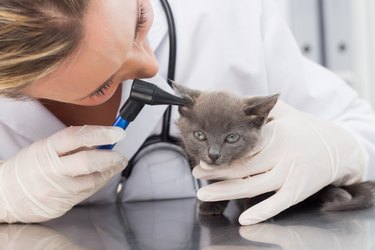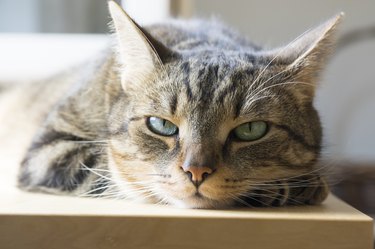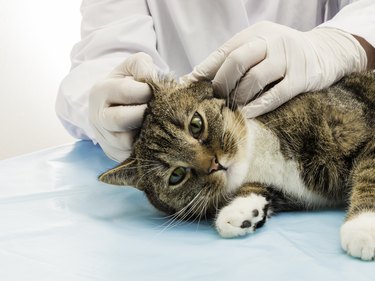If your cat's ears are warm to the touch, this may signal a health condition that warrants a veterinarian's examination. Several different conditions can present with hot ears in some cats, and some of these conditions are more serious than others. Knowing the different potential causes and the additional symptoms to watch for can enable helpful communication with your veterinarian so that he can narrow down the possibilities and make a diagnosis.

Video of the Day
Cat's ears are warm to the touch
If your cat's ears are noticeably hotter to the touch than usual, this could be evidence of a fever. A cat's normal body temperature ranges between 101 and 102.5 degrees Fahrenheit. If your cat's immune system is fighting an infection, her temperature may elevate above the normal range, which is the definition of a fever.
Video of the Day
In addition to hot ears, other signs of a fever may include rapid breathing, sluggishness, and a reduction in appetite. If your cat's ears are hot and her demeanor is even slightly off, she must be seen as soon as possible by your veterinarian so that he can confirm a fever, determine the cause of the infection and initiate treatment.
Allergy symptoms in cats

Red, hot ears can be indicative of allergies. While human allergy sufferers often experience respiratory symptoms, cats and dogs more commonly exhibit the effects in their ears and on their skin. You may also have observed that your cat's ears are hot and itchy.
Allergies in cats may be caused by flea bites, environmental allergens, or dietary ingredients. Once your veterinarian has ruled out other causes of your cat's hot ears, he may then shift his focus to provide symptomatic relief while determining the offending allergen.
Ear mites in cats
Ear mites are parasitic arachnids that crawl inside of your cat's ear canals and feed off of the tissues and debris in her ears. Cats with ear mites are extremely itchy and will persistently scratch their ears. This scratching leads to inflammation of the ears, which can make them feel hot to the touch. In addition to intense scratching and hot ears, you will likely notice an excessive amount of debris in your cat's ears. This debris resembles coffee grinds.
Cats with ear mites are miserable and uncomfortable, and a prolonged infestation can result in a secondary ear infection. Ear mites are easy for your veterinarian to diagnose and treat. Discuss the best ear mite treatment for cats with your veterinarian. Treatment options may include topical medications or an injection.
Ear infections in cats
An ear infection can cause your cat to scratch at her ears and rub her ears on the carpet or on corners of furniture. This scratching can result in inflammation, redness, and hot ears. Other warning signs of an ear infection may include head shaking, excessive amounts of waxy debris, and a foul odor in the ear.
Seek veterinary treatment as soon as possible to provide your cat with relief before she sustains damage to her eardrums. Cat ear infection medicine is prescribed based on the underlying cause of the infection. Follow your vet's instructions when applying ear drops for cats.
Hyperthyroidism in cats

Hyperthyroidism is a common health condition that afflicts senior cats. When a cat has hyperthyroidism, or an overactive thyroid gland, her metabolism increases. This results in an elevated heart rate and body temperature.
Common symptoms of hyperthyroidism in cats may include an increased appetite, weight loss, and restless behavior. If your older cat exhibits hot ears or any of these other signs, bring her to your veterinarian right away. Hyperthyroidism is diagnosed by blood testing, and the condition must be treated in order to prevent secondary hypertension and heart failure.